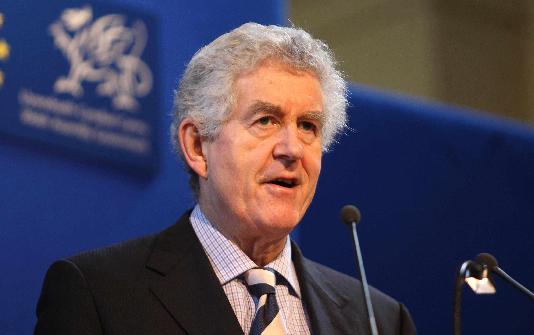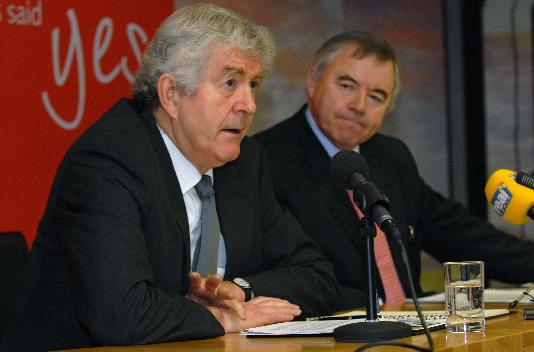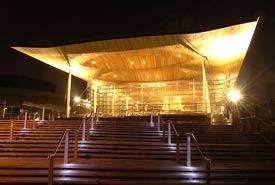


ABP: Wales has had its own government since 1999. What do these 10 years of devolution add up to in Wales ?
Rhodri Morgan : "I think the greatest difference seen in Wales since devolution is our growing sense of confidence. We are willing and eager to make our own decisions, and that is what I consider to be our greatest achievement.
The reason for that is that devolution has been an economic success with unemployment down to UK average: Wales now has 150,000 more jobs net than in 1999. Devolution has not cost jobs. Devolution has actually helped create jobs. A general reason is that we have run Wales without any major scandals.
Wales has changed over the last decade. As a nation we are now far more prepared to take responsibility for ourselves and our own mistakes and learn from them. It's all part of growing up as a nation.
The majority in favour of setting up the Welsh Assembly in the 1997 referendum was wafer-thin. But subsequent opinion polls have shown a growing support from the majority of the public for devolution.
I don't find that surprising because the fears that many 'No' voters may have had that Wales wasn't ready to make its own decisions on the domestic agenda have not proved to be justified. The facts are quite plain that things have got better, not worse, in Wales since the Assembly came into being.
The exciting initiative we have undertaken in education, especially the Welsh baccalaureate for 16-19 year olds and the new Scandinavian-style kindergarten curriculum being rolled out this September involve Wales breaking with 125 years of British educational tradition.
The Assembly Learning Grant to help more people enter higher and further education post 19, the smoking ban and free prescriptions have all made life better for our people.
Free bus travel for pensioners has gone down exceptionally well. It's given the freedom to thousands of elderly people not only to do their weekly shop but to travel widely throughout Wales to visit family and friends.
Our approach to the economy has also changed dramatically over the last 10 years, and will continue to do so. Gone are the days when we used to speculatively build factories and then look for investors to fill the space.
Now we are encouraging companies to develop scientific and technological research facilities in Wales alongside nuts and bolts assembly plants.
A decade ago we didn't have any really world-class companies developing intellectual property here in Wales. But now we have many, including EADS, IBM, Motorola, Avaya, GE Healthcare, General Dynamics and many other top companies at the leading edge of technology
The Airbus wing-making complex in Flintshire, for example, employs over 6,000 people in ultra high-tech jobs, manufacturing all the wings for the Airbus family of aircraft. The Defence Training Academy at St Athan in the Vale of Glamorgan will provide thousands of high quality jobs, training service personnel in an academic environment that will turn Oxford and Cambridge green with envy when it opens for business next decade."
ABP: The powers of the Welsh Assembly are not as great as those of the Scottish Parliament : would you wish to see Wales evolve towards the Scottish model ? If so, why ? If not, why not ?
Rhodri Morgan: "Scotland has a totally different legal tradition to England and Wales but this is a question that we are currently addressing. The Government of Wales Act 2006 provides a mechanism for us to hold a referendum to see whether the people of Wales want the National Assembly to gain greater powers. Both Labour and Plaid Cymru have committed themselves to campaign for a successful outcome to a future referendum on this issue.
My Government has created an All-Wales Convention, chaired by former UK Ambassador to the United Nations Sir Emyr Jones Parry, to gather the views of the people of Wales on whether they want full law-making powers similar to those enjoyed by Scotland. They will report their findings in 2010, and based on their findings the Assembly Government will decide at that time when to call a referendum."
ABP: The Labour Party and Plaid Cymru have been in coalition for a year. What new policies have been jointly formed and implemented together ?
Rhodri Morgan: "The One Wales programme for Government brings together policies from the manifestos of both parties, with a priority on health, education, housing the environment and eradicating child poverty.
This has coincided with the granting of more powers under the Government of Wales Act 2006, which enables us to seek greater legislative competence from Westminster – in effect giving us the ability to create new laws to suit Welsh needs for the first time in more than 500 years.
Our One Wales policy document includes more than 220 pledges for delivery before 2011, and we have already completed many of these, including the introduction of free car parking for hospital patients and staff, becoming the first country in the world to appoint a Commissioner to look after the rights of older people, and introducing a unique school system for children aged between three and seven, encouraging them to learn through play.
We have also published a long term plan for renewable energy, and identified areas of land for the construction of new wind farms as part of our contribution in the battle against climate change."
ABP: What role in today's society would you like to see fulfilled by the Welsh language? Is your Welsh language policy fully understood in London, particularly by the Parliamentary Labour Party in Westminster ?
Rhodri Morgan: "The Welsh language has an important role to play in modern Wales, as an increasing number of pupils attend schools where lessons are conducted through the medium of Welsh. My government is currently in the process of drawing down powers from Westminster to create new legislation on the Welsh language."
ABP: What relationships do you have with the governments of the other Celtic nations, such as Ireland, Northern Ireland and Scotland? And what is your opinion of political developments in Scotland and the Road to Independence advocated by Alex Salmond ?
Rhodri Morgan: "We have a very good working relationship with all the other countries in the UK and with Ireland. We have regular meetings of the British Irish Council where we discuss matters of mutual interest, as well as the Joint Ministerial Committee where I have cordial and constructive discussions with my counterparts in England, Scotland and Northern Ireland.
The issue of independence (or not as the case may be) is something that will be decided by the people of Scotland."
ABP: You signed an agreement with Jean-Yves Le Drian for the Breton Regional Council, what actions have resulted from within the framework of this agreement and do you think there is a possibility of beefing up this collaborative venture ?
Rhodri Morgan: "Wales values the strong and historical ties that we have with Brittany. This relationship was formally recognised and consolidated through the signing of Memorandum of Understanding (MOU) between Wales and Brittany back in 2004. The MOU lays the foundation stones for co-operation between the Welsh Assembly Government and the Regional Council of Brittany across a range of sectors.
In 2006 Wales and Brittany signed an Action Plan which provided the infrastructure for joint working and identified specific areas of activity for further co-operation. Much has been achieved to date and some specific examples of cooperation include;
• Wales acting as the sponsor for Brittany to join the EARLALL (European Association of Regions and Local Authorities for Lifelong Learning) network.
• Joint working in the filed of minority languages. The Welsh Language Board is in the lead on a project funded under the Lifelong Learning Programme 2007-2013. The project comprises a network to promote linguistic diversity and brings together partners from 18 similar language organisations, representing 11 minority languages across the EU, including Welsh and Breton.
• The signing of a co-operation agreement between the Organic Centre Wales Partnership and FRCIVAM BRETAGNE to share ideas, experiences and understanding to benefit the rural communities of both regions.
We are keen to continue to develop the relationship with the Regional Council of Brittany and look forward to a warm fruitful, long lasting friendship."
ABP: Wales will be strongly represented at Lorient this year : what effect do you hope that this will have on the image of Wales ?
Rhodri Morgan: "The Lorient Festival is a very important cultural event. With Wales being the nation of honour, it is an excellent opportunity to showcase the best of Welsh culture and music in a major Celtic festival. I also hope that Welsh music performers at Lorient will be able to learn how the Bretons succeeded in getting Celtic music into the mainstream of the French music market, something the Celtic tradition Welsh music industry has not yet succeeded in doing."
ABP: Thank you.
Interview by Jacques-Yves Le Touze